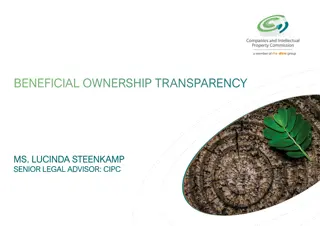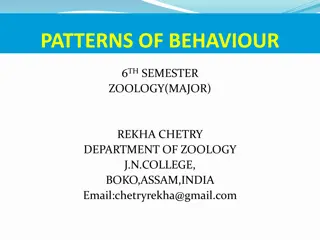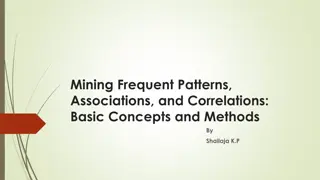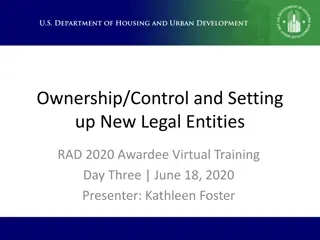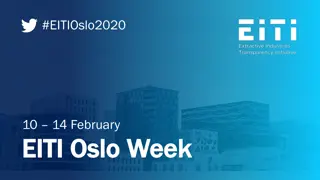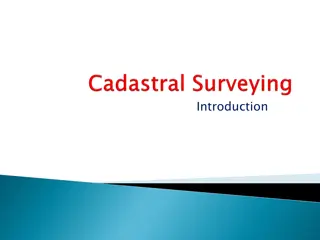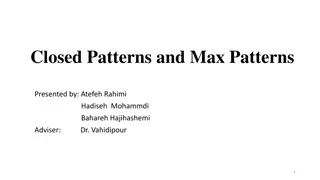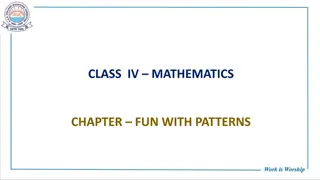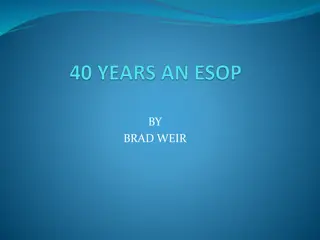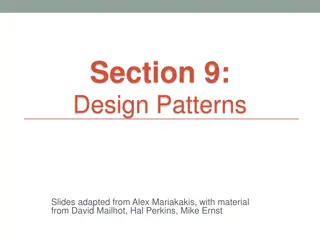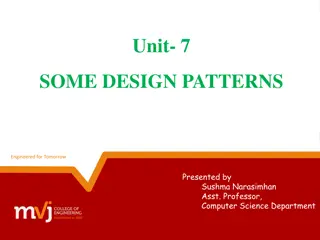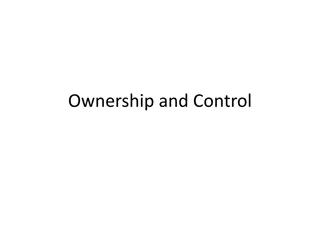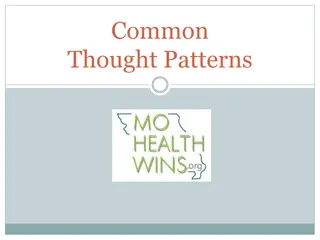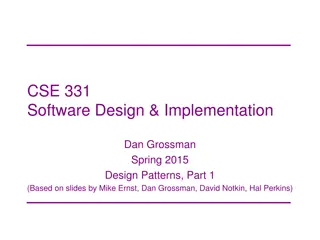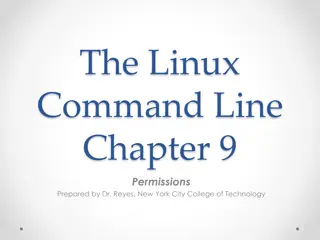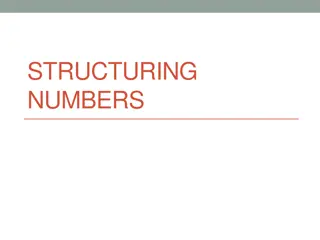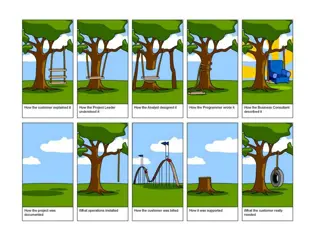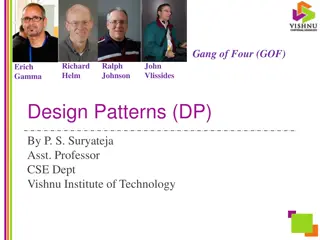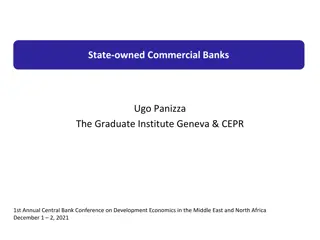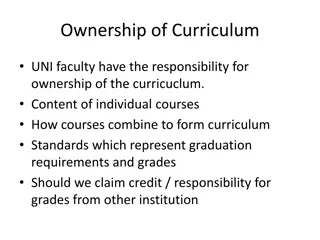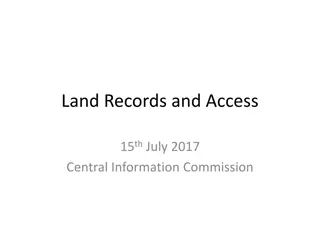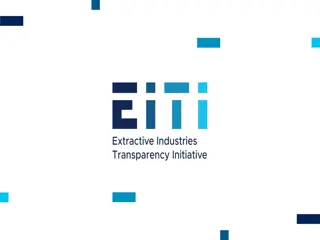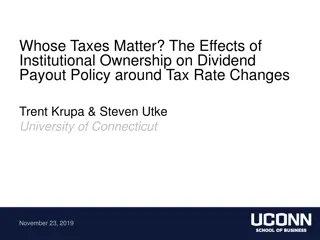Enhancing Beneficial Ownership Transparency: CIPC's Response to FATF Requirements
The Companies and Intellectual Property Commission (CIPC) in South Africa has taken significant steps to address deficiencies highlighted by the Financial Action Task Force (FATF) by establishing a Beneficial Ownership Register. Through this register, CIPC aims to collect accurate information on ben
1 views • 17 slides
BENEFICIAL OWNERSHIP TRANSPARENCY
South Africa's CIPC is addressing deficiencies in beneficial ownership transparency, as highlighted in the October 2021 Mutual Evaluation Report. The country faces increased monitoring due to being placed on the FATF Grey List. CIPC is mandated to establish a Beneficial Ownership Register to ensure
0 views • 16 slides
GRONDDELEN democratiseert grondbezit - Korte introductie en overwegingen
GRONDDELEN is working towards democratizing land ownership in the Netherlands, particularly focusing on agricultural land. The initiative aims to involve citizens in land ownership and management, highlighting the benefits of collective ownership and investment. The rise in interest in nature-inclus
4 views • 15 slides
Enhancing Anti-Money Laundering Laws for Beneficial Ownership Transparency
Presentation by AmaBhungane and Corruption Watch focuses on amending laws to define and disclose beneficial ownership in South Africa, emphasizing the need for clear definitions, low thresholds, and a risk-based approach. Recommendations include a consolidated register, stronger sanctions for compli
1 views • 9 slides
Planning with CSC Continuum of Welsh Language Patterns
This session by Mathias Maurer provides information and examples to support planning with the CSC Continuum of Welsh Language Patterns. It covers introducing new language patterns, transferring familiar patterns to new contexts, planning for progression, and utilizing the continuum for coherent deve
1 views • 44 slides
Understanding Patterns of Behaviour in Zoology: An Overview
Behaviour in animals encompasses a wide range of responses to stimuli in their environment, with patterns that can be innate or learned. This comprehensive overview explores the different behavioural patterns, including tropism, taxis, reflexes, instincts, learning, and reasoning. The importance of
0 views • 17 slides
Understanding Frequent Patterns and Association Rules in Data Mining
Frequent pattern mining involves identifying patterns that occur frequently in a dataset, such as itemsets and sequential patterns. These patterns play a crucial role in extracting associations, correlations, and insights from data, aiding decision-making processes like market basket analysis. Minin
1 views • 95 slides
Legal Entities and Ownership Control in RAD Awardee Training
Explore the nuances of ownership, control, and legal structures in the context of RAD 2020 Awardee training, covering topics such as governing corporations laws, unique ownership requirements, RAD statutes, and implications of ownership changes. Learn about the RAD Ownership/Control Matrix and third
0 views • 28 slides
Understanding Shamilat-e-Deh: Common Village Land Ownership in Pakistan
Shamilat-e-Deh refers to common village land in Pakistan jointly owned by landowners for community purposes. This traditional system dates back to British rule in the subcontinent and involves shared ownership of resources like mosques, schools, and grazing lands. Landowners' shares in Shamilat are
1 views • 16 slides
Understanding Beneficial Ownership Requirements in EITI Standards
The EITI Standard requires countries to disclose the beneficial ownership information of oil, gas, and mining companies by January 2020. This includes details of the beneficial owner's identity, nationality, and any politically exposed status. Maintaining a public register of beneficial owners is re
0 views • 13 slides
Year 2 Mathematics Geometry Patterns and Sequences
Exploring 2D and 3D shape patterns, ordering and arranging mathematical objects in sequences. Tasks involve continuing rotation patterns, mental math exercises, and creating unique shape patterns. Emphasis on rules for patterns and developing critical thinking skills in geometry.
1 views • 18 slides
Understanding Cadastre and Cadastral Surveying
Cadastre is a system containing land information, while cadastral surveying involves defining property boundaries and land ownership rights. Cadastral surveys subdivide land parcels for ownership and document property ownership with geometric descriptions. Real property ownership denotes the authori
2 views • 17 slides
Cooperative Ownership and Democratic Participation in Economic Models
Explore the principles of cooperative ownership, democratic participation, and economic models as advocated by Jessica Gordon-Nembhard. She emphasizes the historical significance of collective work, indigenous cooperative efforts, and the values of shared risk and surplus sharing in community-owned
0 views • 71 slides
Understanding Closed Patterns and Max Patterns in Data Mining
Explore the concepts of closed patterns and max patterns in data mining, along with challenges and solutions. Learn how closed patterns compress frequent patterns while maintaining support information, and how max patterns provide a lossy compression. Discover the difference between closed patterns
0 views • 10 slides
Fun with Patterns: Exploring Creativity and Logic in Mathematics
Dive into the world of patterns with this interactive mathematics chapter, learning how to identify, extend, and create patterns using everyday objects like flowers and leaves. Explore the art of pattern-making, discover the magic of number patterns, and engage in hands-on activities to enhance your
0 views • 39 slides
Understanding ESOP: Ownership Structures, Basics, and Culture
Exploring the Employee Stock Ownership Plan (ESOP) in depth, covering ownership structures including family-owned, partnerships, and outside investors. Delve into ESOP basics such as ERISA and Department of Labor regulations, as well as the structure involving trustees, Board of Directors, and compa
0 views • 7 slides
Understanding Academic Journals: Ownership, Operations, and Processes
Explore the inner workings of academic journals, including ownership by the academic community, key operational structures, and the review process timeline. Gain insights into reputable vs. predatory publishers, implications of ownership, and the roles of editors, reviewers, and policy boards.
0 views • 17 slides
Analysis of Gathering Patterns from Trajectories - ICDE 2013
Prevalence of trajectory data due to location acquisition technology enables understanding movement behaviors, group travel patterns, and anomaly detection. Co-travellers patterns like Flocks, Convoys, and Swarms are defined based on group characteristics. Gathering patterns involve events with cong
2 views • 20 slides
Comparison of Ownership Concepts in the Iraqi and Louisiana Civil Codes
The preliminary part of the Iraqi Civil Code recognizes various rights in rem, including ownership, disposal, usufruct, use, habitation, servitudes, and leases. It details the concept of ownership, perfect ownership rights, and additional rights such as "surface right" and tasarruf. The Iraqi Code a
0 views • 5 slides
Benefits and Challenges of Public Ownership of Utilities
Public ownership of utilities offers economic gains, democratic control, and addresses public interest objectives such as renewable energy and affordability. This model presents opportunities for cost savings, local economies, and transparent planning. However, challenges like debt accumulation and
1 views • 15 slides
Strengthening National Ownership of Immunization Programs through Parliamentary Engagement
Strengthening national ownership of immunization programs is crucial for ensuring effective and quality vaccination services for all. This involves generating political commitment, enhancing community awareness, addressing vaccine hesitancy, and improving system capabilities. National ownership is e
0 views • 18 slides
Understanding Design Patterns in Java Programming
Learn about design patterns in Java programming, including creational patterns such as Singleton, Factory, and Builder. Explore how design patterns provide solutions to common programming problems, making code more flexible and efficient. Dive into examples and implementations to enhance your unders
0 views • 31 slides
Understanding Design Patterns for Software Development
Explore the world of design patterns in software development, including structural decomposition, organization of work, access control, and communication patterns. Learn the differences between design and architectural patterns, and how they influence software systems. Discover categories of design
1 views • 107 slides
Ownership and Control Regulations in ASEAN Air Transport Industry
The content discusses ownership and control restrictions in the air transport industry across ASEAN countries, outlining foreign ownership limits and regulations. It highlights the need for liberalization to align with the ASEAN Comprehensive Investment Agreement (ACIA). Various ownership models are
0 views • 4 slides
Understanding Common Thought Patterns in Communication
Common thought patterns in communication help structure messages effectively to increase understanding and engagement. Recognizing these patterns benefits readers by enhancing comprehension, engagement, recall, and writing skills. The five most common thought patterns are list, sequence, definition,
0 views • 16 slides
Introduction to Software Design Patterns in CSE 331 Spring 2015
Dive into the world of design patterns with a focus on creational patterns, structural patterns, and behavioral patterns in the context of software design and implementation. Explore concepts like encapsulation, subclassing, and iteration along with their problems, solutions, advantages, and disadva
0 views • 48 slides
Ownership in France: Civil Law and Key Attributes
Exploring ownership in France under Civil Law, this content delves into the rights and characteristics associated with ownership, including the right to enjoy, dispose of property, and the protection mechanisms available. It covers key concepts such as Usus, Fructus, and abusus, along with legal pri
0 views • 11 slides
Understanding File Permissions and Ownership in Linux
This content discusses the concept of file permissions and ownership in Linux, covering the three levels of ownership (owner, group, everybody), the usage of the 'ls -l' and 'id' commands to check identity information, changing file permissions using the 'chmod' command with octal notation, and meth
0 views • 5 slides
Developing Number Sense in the Classroom
Explore various strategies to help young children develop number sense, including subitizing, finger patterns, spatial patterns, pair-wise patterns, five-wise patterns, partitions of five and ten, and adding and subtracting to 10. These activities involve using visual aids, dice patterns, finger cou
0 views • 46 slides
Understanding Partner Ownership and Demand in Capacity Development
This module delves into the significance of ownership in capacity development (CD) initiatives, highlighting challenges faced and solutions. It emphasizes the importance of partner commitment and ownership to drive successful change processes. The content explores various perspectives on ownership a
0 views • 18 slides
Impact of CC BY-NC or CC BY-NC-ND Licenses on Ownership
Understanding the impact on ownership when choosing between CC BY-NC or CC BY-NC-ND Creative Commons licenses in academic publishing. Different publishers have varying policies on ownership transfer, re-use rights, and commercial usage. Authors may need to consider these factors carefully before sel
0 views • 5 slides
Understanding Design Patterns in Software Development
Learn about design patterns in software development, including creational patterns like Singleton, Factory, and Builder. Discover how design patterns provide solutions to common programming problems, increase code flexibility, and improve program design. Gain insights into the concepts of Singleton
0 views • 33 slides
Understanding Design Patterns: A Comprehensive Overview
Exploring the world of design patterns, this content delves into the essence of design patterns, their application in software design to resolve complexity, and the different types of design patterns - creational, structural, and behavioral. It also showcases examples of popular design patterns such
0 views • 22 slides
Introduction to Design Patterns: Understanding GOF Patterns
Explore the world of design patterns with a focus on Gang of Four (GOF) patterns. Understand the essence of design patterns, learn about GOF patterns, and discover how to select, apply, and use these patterns effectively. Dive into the fundamentals of design patterns, including creational and struct
0 views • 115 slides
Analysis of State-owned Commercial Banks Ownership Patterns
Data analysis of ownership histories for over 27,000 commercial banks in 184 countries from 1995-2018, focusing on state-owned banks. The study reviews state ownership trends, correlations with bank performance, industry-level evidence, and lending to governments. The research also delves into perfo
0 views • 28 slides
Understanding Curriculum Ownership and Transfer Policies in Higher Education
Faculty ownership of curriculum involves responsibilities like determining course content, forming curriculum structure, and setting graduation requirements. Policies and procedures, usually overseen by the Faculty Senate, enable faculty ownership. Transfer credits and grades play a crucial role in
0 views • 16 slides
Islamic Finance Task Team on Economic Ownership of Non-Financial Assets
This task team focuses on determining the economic ownership of non-financial assets in Islamic finance practices like sales, lease, and equity financing. Recommendations are being developed to address issues related to economic ownership, including recording assets on balance sheets and handling de
0 views • 11 slides
Importance of Land Records in Preventing Land Disputes
Land records play a crucial role in documenting ownership, facilitating land-related transactions, and preventing costly litigation. They serve as a lifeline for effective governance and provide legal status to landowners, ensuring clarity and transparency in land ownership. Without proper land reco
0 views • 15 slides
Understanding Beneficial Ownership in Oil, Gas, and Mineral Resources Governance
Beneficial Ownership (BO) is a crucial aspect of governance in the oil, gas, and mineral sectors. Requirement 2.5 of the global standards mandates disclosure of the natural person(s) who directly or indirectly ultimately own or control a corporate entity. Elements of BO include natural persons, owne
0 views • 22 slides
Effects of Institutional Ownership on Dividend Payout Policy
This study examines how a firm's ownership structure, particularly institutional ownership, influences its dividend policy around tax rate changes. It explores the impact of tax-sensitive/insensitive institutional ownership, the role of dedicated institutions as monitors, and the interaction between
1 views • 26 slides

